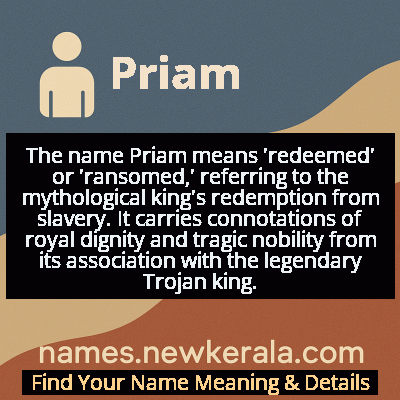Priam Name Meaning & Details
Origin, Popularity, Numerology Analysis & Name Meaning of Priam
Discover the origin, meaning, and cultural significance of the name PRIAM. Delve into its historical roots and explore the lasting impact it has had on communities and traditions.
Name
Priam
Gender
Male
Origin
Greek
Lucky Number
3
Meaning of the Name - Priam
The name Priam means 'redeemed' or 'ransomed,' referring to the mythological king's redemption from slavery. It carries connotations of royal dignity and tragic nobility from its association with the legendary Trojan king.
Priam - Complete Numerology Analysis
Your Numerology Number
Based on Pythagorean Numerology System
Ruling Planet
Jupiter
Positive Nature
Optimistic, inspirational, and creative.
Negative Traits
Scattered, exaggerating.
Lucky Colours
Yellow, gold, purple.
Lucky Days
Thursday.
Lucky Stones
Yellow sapphire.
Harmony Numbers
1, 2, 9.
Best Suited Professions
Arts, writing, communication.
What People Like About You
Creativity, optimism.
Famous People Named Priam
Priam of Troy
Mythological King
Legendary ruler of Troy during the Trojan War, father of Hector and Paris
Priam Farrel
Academic
Notable scholar in classical studies and Homeric literature
Priam Harvey
Artist
Influential painter known for mythological themes and classical revival works
Name Variations & International Equivalents
Click on blue names to explore their detailed meanings. Gray names with will be available soon.
Cultural & Historical Significance
His famous nighttime journey to Achilles' camp to retrieve Hector's body stands as one of literature's most poignant scenes, demonstrating the power of paternal love transcending enemy lines and highlighting shared humanity amid conflict. Throughout Western literature and art, Priam has served as an archetype of the fallen king and grieving father, influencing countless works that explore themes of leadership, sacrifice, and the human cost of war. His legacy continues to resonate in modern interpretations of classical mythology.
Extended Personality Analysis
Individuals named Priam are often perceived as dignified, authoritative, and deeply family-oriented, reflecting the mythological king's characteristics. They tend to exhibit strong leadership qualities combined with emotional depth and a protective nature toward their loved ones. Like their namesake, they may demonstrate resilience in adversity and a capacity for profound grief and compassion.
These individuals often carry themselves with regal bearing and command respect naturally, while maintaining a strong sense of duty and responsibility to those under their care. Their personality blends strength with sensitivity, making them both formidable and empathetic figures in their personal and professional lives. The name suggests someone who balances traditional values with emotional intelligence, capable of both decisive leadership and deep personal connections.
Modern Usage & Popularity
In contemporary times, Priam remains a rare but meaningful choice, primarily used by parents with interest in classical mythology or seeking a name with historical depth and regal connotations. The name maintains a consistent but low-level usage, often appearing in academic, literary, or culturally aware families. While not appearing on popular baby name charts, it enjoys steady recognition among classic name enthusiasts. Its usage has seen minor resurgences following major film or television adaptations of Trojan War stories, but generally remains an unconventional choice that signals intellectual or cultural sophistication rather than following naming trends.
Symbolic & Spiritual Meanings
Symbolically, Priam represents the tragic monarch, the grieving father, and the embodiment of fallen glory. The name carries connotations of redemption (from its etymological meaning), the transience of power, and the universal nature of paternal love. It symbolizes the intersection of personal tragedy and public duty, serving as a metaphor for leadership in times of crisis and the human cost of conflict. Priam also represents the idea that even the mightiest can fall and that true strength often manifests in vulnerability and compassion rather than mere physical or political power, making it a name rich with philosophical and emotional resonance.

